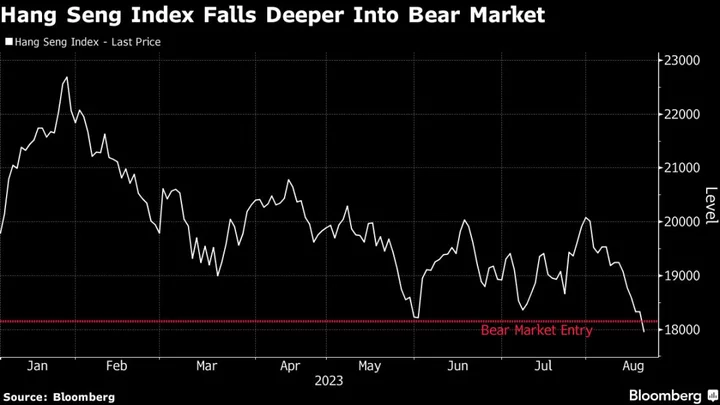Chinese stocks extended losses as mainland banks surprisingly kept a key interest rate tied to mortgages on hold, in a move that raised doubts over the country’s commitment to support the embattled property sector.
The Hang Seng China Enterprises Index, which tracks Chinese stocks listed in Hong Kong, slumped 1.9% to the lowest since November. The Hang Seng Index, which fell into a bear market on Friday, slid for a seventh straight day, the longest losing streak since November 2021.
The five-year loan prime rate was unexpectedly held steady at 4.2% on Monday, when most economists had predicted the rate to be cut by 15 basis points following a similar reduction last week to a key policy rate. The disappointment intensified a selloff as traders were hoping for stimulus to gather pace. Financials were among the top losers as the move was seen to reflect lenders’ rising concerns over their profit margins.
Heeding calls from authorities to bolster the market, China’s largest mutual fund houses promised to buy their own equity-focused products. At least 14 firms pledged to invest in their funds as of mid-Monday, taking the total tally to 870 million yuan ($119 million).
The planned purchases come on the heels of renewed vows from the securities watchdog Friday to boost markets, including cuts to stock handling fees and consideration to extend trading hours. Mainland exchanges last week asked some investment funds to avoid net selling equities. Officials also requested state-owned banks to escalate intervention to support the yuan, while also encouraging companies listed on the tech-heavy Star Board to buy back shares.
So far, the measures have yet to revive the market. The CSI 300 Index shed 7.1% this month, underperforming most of the global benchmarks. Foreign investors took their net selling streak of mainland shares to a record 11th session on Monday. Excessive selling also mean the index is now at the most oversold level since June. This has prompted some analysts to turn bullish in the near term.
Chinese equities are likely to trend higher in the short term given positive cues emerging from sales of state-owned property developers, according to Hao Hong, chief economist at Grow Investment Group. “Longer term, however, the picture is murkier. China’s private sector leverage has reached a plateau similar to that of Japan at the peak of its bubble in 1993.”
Meanwhile, Goldman Sachs Group Inc. slashed the target price of the MSCI China Index for a second time in three months, as pessimism permeates the country’s stock market following a deepening property crisis and signs of stress in the shadow banking system. Recent measures by authorities to boost market confidence have been piecemeal in nature, with Goldman’s economists also predicting any large-scale stimulus from Beijing off the table for now.
“The post-July-Politburo excitement was short-lived,” strategists including Kinger Lau wrote, referring to the Communist Party’s top decision-making body. “The ailing housing market and its potential contagion to the real and financial economies are the widely-cited reasons for the correction.”
(Updates throughout)

